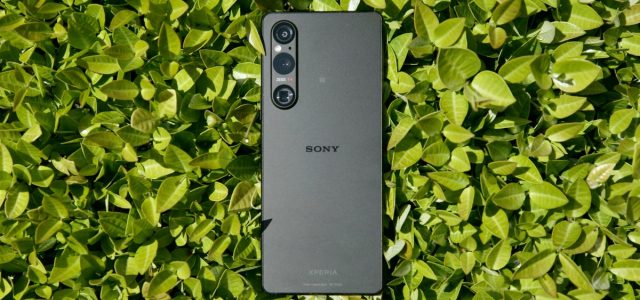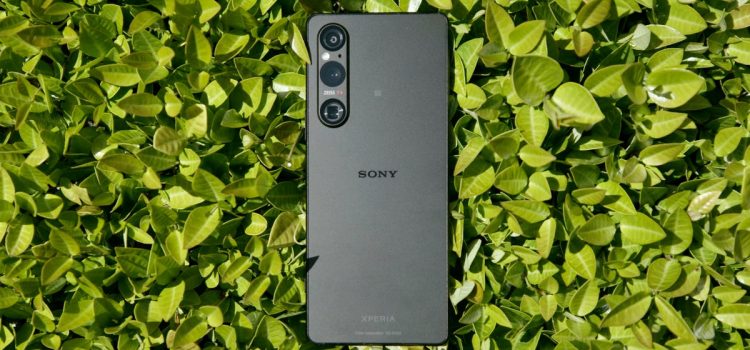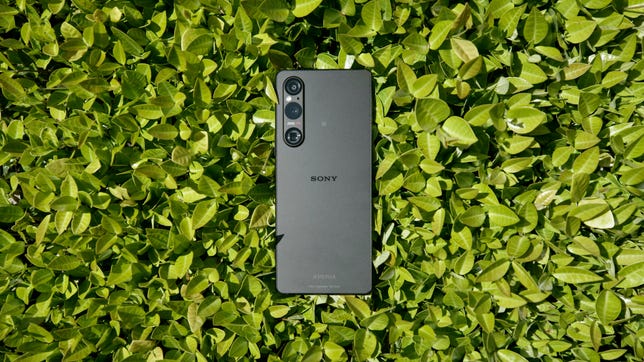


The new Sony Xperia 1 V retains all the best features of previous Xperia 1 phones, like a 4K high refresh rate display, expandable storage, cutting-edge cameras with eye-tracking autofocus, a 5,000-mAh battery, a dedicated hardware shutter button and a headphone jack, all wrapped in Sony’s lovely, mundane utilitarian design. The phone brims with numerous quality of life improvements for its target audience of creative types like photographers, filmmakers, musicians and gamers who want nuanced control over the content they make.
The sides of the phone are ribbed, which make it easier to grip, a Qualcomm Snapdragon 8 Gen 2 processor makes things fast, Gorilla Glass Victus 2 adds durability to the phone’s screen, and the ability to rotate the Photo Pro and Video Pro apps between landscape and portrait just makes sense. The glass on the back of the phone has an imprinted texture that elevates the look and feel. Though — despite its high price — you’d never describe this as a posh phone.
And then there are the cameras. Oh, the cameras! This past December, Tim Cook shared a post on Twitter about Apple and Sony’s long partnership going back over a decade revolving around the iPhone camera. The tweet included a photo of Tim Cook in a very Vincent D’Onofrio Law and Order-esque lean-in pose looking at iPhones being tested in a Sony camera lab. Apple uses Sony camera sensors in the iPhone and those same sensors often make their debut in Xperia phones. One of the biggest upgrades to the Xperia 1 V is a new sensor for the main camera. I should note, that it’s not guaranteed that the sensors in this phone will be used in a future iPhone.

7.9
Sony Xperia 1 V
Like
Subtle design improvements
Photos in mixed and medium light look great
Using it as an external monitor/video recorder
Don’t like
The $1,400 price
Night mode pics are hit or miss
Videos recorded in low or mixed lighting don’t look great
I’ve been using a preproduction Xperia 1 V on loan from Sony for about a week. And I’m impressed with nearly everything, especially the cameras. Sony pushed its state of the art hardware to another level by embracing more computational photography like Apple, Google and Samsung.
But there is a drawback that overshadows all these niceties. The Xperia 1 V costs $1,400, which converts roughly to £1,110 or AU$2,070. If your eyes sting a bit from that number, you’re not alone. And no, the phone doesn’t fold in half. In fact, the Xperia 1 V has done something unthinkable: It made the $1,200 Samsung Galaxy S23 Ultra seem like a deal. Yes, the Xperia is the only phone I’m aware of, aside from last year’s model, with a 4K 120Hz refresh rate display and a telephoto camera with lens elements that move like an actual camera lens. The S23 Ultra and iPhone 14 Pro don’t have either. But both Apple and Samsung found ways to make photos and videos look just as amazing, and at times more so, than Sony does without the extremely high price — I mean, a grand or $1,200 is still a lot.
Watch this: Review: We Tested the Cameras on the Sony Xperia 1 V
There is one particular use case where the Xperia 1 V is worth considering, and that’s if you plan to use it as an external field monitor and video recorder for a dedicated camera. You can not only livestream from an external camera through the Xperia but now you can record the video feed. The Xperia’s 4K resolution display sets it apart from other external monitor recorders like Atmos, SmallHD or Blackmagic, which tend to have FHD displays. At $1,400, the Xperia becomes a decent value compared to the cost of buying a separate phone like the $1,000 iPhone 14 Pro and a $400 FHD display.
You can order the Sony Xperia 1 V starting July 28 with preorders starting today at 8 a.m. PT. To make the Xperia more enticing, Sony has a preorder special where you get a pair of $180 Sony LinkBuds for free.
The Sony Xperia 1 V’s cameras
Hardware-wise three out of the four cameras are the same as last year’s Sony Xperia 1 IV. On the front there’s a 12-megapixel selfie camera and on the back there’s the same 12-megapixel ultrawide, and a 12-megapixel telephoto camera. While not new, that telephoto is one of the standout features on the Xperia 1 V. The variable telephoto lens gives the phone an optical zoom range of 3.5x to 5.2x magnification. Compare that to the iPhone 14 Pro, which only has optical zoom at 3x and anything more is digital zoom. Or look at the Galaxy S23 Ultra, which has a 3x optical zoom camera and a 10x optical zoom camera, but in between 3x and 10x it’s all digital zoom. The more a phone digitally zooms in, the more the image starts to fall apart.
In use, the tele makes the Xperia a much more versatile camera than the iPhone. And while it lacks the 100x digital “space zoom” found on the S23 Ultra, it matches Samsung in its utility to grab close-up snaps and videos while being far away from your subject. The Xperia 1 V, like the S23 Ultra, might be an affluent parent’s dream phone. It could easily capture their kid’s face close up in a school play, recital or soccer match.
A close up of the Xperia’s camera bump.
But the real news is Sony’s new 52-megapixel sensor on the main camera. Unlike the square-ish sensors on the majority of phones, this one is wider. When you take photos on pretty much any other phone, the camera uses the entire sensor and when you record videos, the phone uses a 16×9 crop in the middle.
What Sony did is to widen the sensor so that videos use all of the sensor’s height. Photos are cropped in from the sides down to 48 megapixels and binned in groups to produce 12-megapixel photos. The new sensor is also faster, which allows Sony to use more computational photography processing.
All of this adds up a new dedicated night mode and better processing for medium, low light and mixed lighting. In my week with the phone, everything except night mode has lived up to Sony’s promises. I’m especially impressed how the Xperia makes highlights roll off so naturally in photos.
Take a look at some of my favorite photos from the Xperia below.
The Xperia captured the light and colors perfectly. I mean look at those highlights.
Friends definitely not posing at brunch.
Peebles the cat taking a nap. The dynamic range in photos is quite good.
A plant in Salesforce Park taken with the 3.5x – 5.2x telephoto camera.
I grabbed this pic of a giant RGB honey bear bottle mural with the 3.5x – 5.2x telephoto camera.
Another telephoto photo, this time using digital zoom. I dig how the Xperia is able to make the Salesforce Tower seem like it’s looming over the street.
How does the Xperia compare to the iPhone 14 Pro? Pretty good, actually. Take a look below at photos I took inside Peoples Barbershop in San Francisco. In the Xperia’s photo, notice the window and the man who is seated on the left. In the iPhone’s photo, the man’s head and neck are in a shadow. Also notice that the lettering on the tips sign on the right is sharper in the iPhone’s photo. In fact, on the whole, the iPhone’s photo looks over-sharpened, compared to the one from the Xperia.
Below are photos of a dog outside a skate shop. I took these photos at 3.5x on the Xperia and 3x on the iPhone. The texture of the dog’s fur looks great in both. The Xperia’s photo has a natural out-of-focus background from its lens, whereas in the iPhone’s photo, the background is also in focus. On the whole these are both good shots, but I prefer the one from the Xperia. The dog looks flat in the iPhone pic and pops more in Sony’s snap.
Now let’s add the Galaxy S23 Ultra to the mix. Below are photos of some baked eggs from Luna. The iPhone’s photo looks over-sharpened, notice the bread. The colors are a bit muted. Also there is daylight coming in from the left side, but warm overhead lighting above. The iPhone’s white balance looks more cool. Samsung’s photo nails the red color of the romesco sauce and did the best job in terms of overall color temperature. The Xperia’s photos definitely skew warm, with the colors looking oversaturated. Also, the Xperia chose to focus on the kale as opposed to the bread — just as my doctor wants me to do more often.
The image from the Sony Xperia 1 V has punchy contrast and colors.
Let’s go someplace really dark — like the basement bar at Smuggler’s Cove. These photos were taken with the phone’s night mode. Of the three, my favorite is the one from the Galaxy S23 Ultra. The Xperia does a good job of handling the shadows and colors, but the bartenders’ movements during the capture resulted in a blurry mess with blown highlights.
The Xperia 1 V is the first Sony phone with a night mode. Unfortunately, it’s rather hit-or-miss.
Overall, I’m glad Sony boosted the computational photography on the Xperia. It’s a success in most situations, but my tests also show Samsung’s dominance when it comes to night mode.
In terms of videos, the Sony hangs right along with the iPhone 14 Pro and Galaxy S23 Ultra under bright light. But as things get dark, Apple’s video processing prowess keeps its videos looking better. For samples of videos from each phone, check out my review video for the Sony Xperia 1 V.
After all that testing, it’s equally important to consider the process of capturing photos and videos. And that’s where the Xperia comes out ahead of the iPhone 14 Pro and Galaxy S23 Ultra. There are people who prefer to dial in the settings for exactly how their photos and video are captured, and the Xperia is aimed at them. It’s not designed to be a one-handed point-and-shoot experience.
The Xperia’s Photo Pro and Video Pro apps (and Cinema Pro) let you adjust every last detail to get photos and videos looking the way you want. There are third-party apps for the iPhone and S23 Ultra that can do the same, but I haven’t seen anything to the level of what Sony does. Photo Pro essentially turns the phone into an identical interface as Sony Alpha cameras. There is also a dedicated hardware shutter button on the right side of the phone, something the iPhone 14 Pro and Galaxy S23 Ultra lack.
Perhaps one of the most telling moments during testing came when my colleague, CNET Principal Video Producer John Kim, and I were filming the review video. When we were walking around Salesforce Park, and I spotted a baby bird on the ground. I opened the Photo Pro app and the camera’s eye autofocus instantly locked onto the tiny bird’s eyes and tracked it. I didn’t even have to tap on the screen.
And here’s the bird. I was probably about 5 feet away; Eye AF did all the work keeping the little guy in focus.
The Sony Xperia 1 V’s battery and performance
At the heart of the Xperia is 12GB of RAM and the aforementioned Snapdragon 8 Gen 2 chip. These specs make the Xperia 1 V peppy and fast. The phone handled heavy days of shooting photos and videos as well as more mundane things like scrolling social media and playing video games with ease. A lot of that is because of the processor. We had the same experience this year using other 8 Gen 2 chip phones like the Galaxy S23 Ultra and the Asus ROG Phone 7 Ultimate. In benchmark tests, the Xperia hangs right up there alongside Samsung, Asus and Vivo.
3DMark Wildlife Extreme
Sony Xperia 1 V 3,683Samsung Galaxy S23 Ultra 3,802Vivo X90 Pro 3,700Asus ROG Phone 7 Ultimate 3,748
GeekBench V.5.0 Single-core
Sony Xperia 1 V 1,469Samsung Galaxy S23 Ultra 1,541Vivo X90 Pro 1,384Asus ROG Phone 7 Ultimate 1,454
Geekbench V.5.0 Multicore
Sony Xperia 1 V 4,971Samsung Galaxy S23 Ultra 4,954Vivo X90 Pro 4,303Asus ROG Phone 7 Ultimate 5,080
In terms of battery, I easily got through a day on a single charge but that 4K display, especially when it’s at 120Hz, eats a lot of it up. I question the choice of including a 4K display. It is truly lovely having all that resolution and high frame rate, but if Sony dropped down to a QHD it would help with battery life and likely lower the overall cost of the phone. I don’t think most people would be able to tell the difference. But again, the Xperia is aimed at people who probably would notice, especially if you plan to use the phone as an external monitor recorder.
In CNET’s streaming video test, where we set the display’s brightness to 50% and stream a video over Wi-Fi for several hours, the Xperia and its 4K 120Hz display dropped from 100% to 88% after an hour and down to 75% after two hours. For perspective, when the OnePlus 11 went through the same test with its QHD 120Hz screen, it dropped from a full battery to 92% after an hour and 85% after two.
In terms of charging, the Xperia supports 30W fast charging. Sony doesn’t include the charger or even a USB-C cable in the box. But after 30 minutes of charging with a 30W power brick, the battery went from 25% to 73%. The phone also supports wireless charging, and during a 30-minute test the battery went from 58% to 85%.
The Sony Xperia 1 V final thoughts
The back glass on the Sony Xperia 1 V is textured, which helps with grip and makes it look a bit more chic.
I am a big fan of what Sony is doing with its Xperia line of phones. The Xperia 1 V represents years of innovation and improvements, all focused at its target audience of artists and creative types. And if I judge the phone through that perspective, the Xperia gets so much right.
However, my favorite Xperia phones tend to be the slightly lower cost 5 series. Note that last year’s Xperia 5 IV still costs $1,000. The 5 series tends to inherit most of the amazing specs and features from the 1 series but comes without a $1,400 price tag.
Personally, when I was a theater director and short filmmaker, I would have loved the Xperia 1 V. But I would have never been able to afford one. Instead I’d likely opt for a dedicated camera like Sony’s Alpha line of APS-C cameras.
How we test phones
Every phone tested by CNET’s reviews team was actually used in the real world. We test a phone’s features, play games and take photos. We examine the display to see if it’s bright, sharp and vibrant. We analyze the design and build to see how it is to hold and whether it has an IP-rating for water resistance. We push the processor’s performance to the extremes using both standardized benchmark tools like GeekBench and 3DMark, along with our own anecdotal observations navigating the interface, recording high-resolution videos and playing graphically intense games at high refresh rates.
All the cameras are tested in a variety of conditions from bright sunlight to dark indoor scenes. We try out special features like night mode and portrait mode and compare our findings against similarly priced competing phones. We also check out the battery life by using it daily as well as running a series of battery drain tests.
We take into account additional features like support for 5G, satellite connectivity, fingerprint and face sensors, stylus support, fast charging speeds, foldable displays among others that can be useful. And we of course balance all of this against the price to give you the verdict on whether that phone, whatever price it is, actually represents good value.
